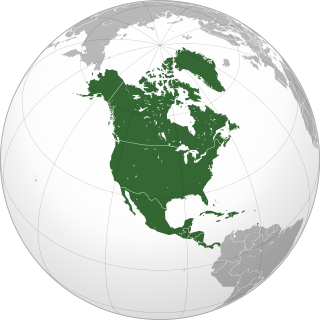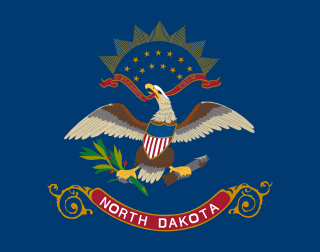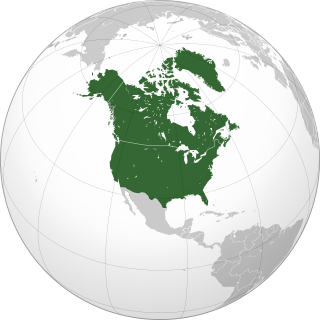
Alaska is a U.S. state in the Western United States, on the northwest extremity of the country's west coast. A semi-exclave of the U.S., it borders the Canadian province of British Columbia and territory of Yukon to the east and has a maritime border with Russia's Chukotka Autonomous Okrug to the west, just across the Bering Strait. To the north are the Chukchi and Beaufort seas of the Arctic Ocean, while the Pacific Ocean lies to the south and southwest.

The Atlantic Ocean is the second-largest of the world's oceans, with an area of about 106,460,000 km2 (41,100,000 sq mi). It covers approximately 20 percent of Earth's surface and about 29 percent of its water surface area. It is known to separate the "Old World" from the "New World" in the European perception of the World.

The American Revolutionary War, also known as the Revolutionary War or the American War of Independence, was initiated by delegates from thirteen American colonies of British America in Congress against Great Britain over their objection to Parliament's taxation policies and lack of colonial representation. From their founding in the 1600s, the colonies were largely left to govern themselves. The cost of victory in the 1754 to 1763 French and Indian War and the 1756 to 1763 Seven Years' War left the British government deeply in debt; the colonies, where the war was fought, equipped and populated the British forces there at the cost of millions of their own funds. The Stamp Act and Townshend Acts provoked colonial opposition and unrest, leading to the 1770 Boston Massacre and 1773 Boston Tea Party. When Parliament imposed the Intolerable Acts in spring 1774 upon Massachusetts, twelve colonies sent delegates to the First Continental Congress to draft a Petition to the King and organize a boycott of British goods.

The American Civil War was a civil war in the United States fought between northern and Pacific states and southern states that voted to secede and form the Confederate States of America. The central cause of the war was the status of slavery, especially the expansion of slavery into newly acquired land after the Mexican-American War. On the eve of the Civil War in 1860, four million of the 32 million Americans were black slaves, mostly in the South.

The Korean War was a war between North Korea and South Korea. The war began on 25 June 1950 when North Korea invaded South Korea following clashes along the border and insurrections in the south. The war ended unofficially on 27 July 1953 in an armistice.

North America is a continent entirely within the Northern Hemisphere and almost all within the Western Hemisphere. It can also be described as the northern subcontinent of the Americas. It is bordered to the north by the Arctic Ocean, to the east by the Atlantic Ocean, to the southeast by South America and the Caribbean Sea, and to the west and south by the Pacific Ocean. Because it is on the North American Tectonic Plate, Greenland is included as part of North America geographically.

North Carolina is a state in the Southeastern region of the United States. North Carolina is the 28th largest and 9th-most populous of the 50 United States. It is bordered by Virginia to the north, the Atlantic Ocean to the east, Georgia and South Carolina to the south, and Tennessee to the west. Raleigh is the state's capital and Charlotte is its largest city. The Charlotte metropolitan area, with an estimated population of 2,569,213 in 2018, is the most-populous metropolitan area in North Carolina, the 23rd-most populous in the United States, and the largest banking center in the nation after New York City. The Raleigh-Durham-Cary combined statistical area is the second-largest metropolitan area in the state, with an estimated population of 2,079,687 in 2019, and is home to the largest research park in the United States, Research Triangle Park.

North Dakota is a U.S. state in the upper Midwestern United States. It is named after the Lakota and Dakota Sioux Native American tribes, who comprise a large portion of the population and historically dominated the territory. It is the nineteenth largest in area, the fourth least populous, and the fourth most sparsely populated of the 50 states with a population of 779,094 according to the 2020 census. Its capital is Bismarck, and its largest city is Fargo.

The Americas, which are also collectively called America, are a landmass comprising the totality of North and South America. The Americas make up most of the land in Earth's Western Hemisphere and comprise the New World.

The Vietnam War, also known as the Second Indochina War, was a conflict in Vietnam, Laos, and Cambodia from 1 November 1955 to the fall of Saigon on 30 April 1975. It was the second of the Indochina Wars and was officially fought between North Vietnam and South Vietnam. North Vietnam was supported by the Soviet Union, China, and other communist allies; South Vietnam was supported by the United States, South Korea, the Philippines, Australia, Thailand, and other anti-communist allies. The war, considered a Cold War-era proxy war by some, lasted 19 years, with direct U.S. involvement ending in 1973, and included the Laotian Civil War and the Cambodian Civil War, which ended with all three countries becoming communist in 1975.

The Thirteen Colonies, also known as the Thirteen British Colonies or the Thirteen American Colonies, were a group of British colonies on the Atlantic coast of North America. Founded in the 17th and 18th centuries, they declared independence in 1776 and together formed the United States of America.

The CONCACAF Gold Cup is the main association football competition of the men's national football teams governed by CONCACAF, determining the continental champion of North America, Central America, and the Caribbean. The Gold Cup is held every two years. It was previously referred to as the CONCACAF Championship before being renamed to the CONCACAF Gold Cup starting in 1991.

Wolf spiders are members of the family Lycosidae, from the Ancient Greek word λύκος, meaning "wolf". They are robust and agile hunters with excellent eyesight. They live mostly in solitude and hunt alone, and do not spin webs. Some are opportunistic hunters, pouncing upon prey as they find it or even chasing it over short distances. Some wait for passing prey in or near the mouth of a burrow.

The Confederation of North, Central America and Caribbean Association Football, is one of FIFA's six continental governing bodies for association football. Its 41 member associations represent countries and territories mainly in North America, including the Caribbean and Central America, and due to geopolitical reasons, three nations from the Guianas subregion of South America — Guyana, Suriname, and French Guiana. The CONCACAF's primary functions are to organize competitions for national teams and clubs, and to conduct the World Cup and Women's World Cup qualifying tournaments.

The North American Central Time Zone (CT) is a time zone in parts of Canada, the United States, Mexico, Central America, some Caribbean Islands, and part of the Eastern Pacific Ocean.

Northern America is the northernmost subregion of North America. The boundaries may be drawn slightly differently. In one definition, it lies directly north of Middle America. Northern America's land frontier with the rest of North America then coincides with the Mexico–United States border. Geopolitically, according to the United Nations' scheme of geographic regions and subregions, Northern America consists of Bermuda, Canada, Greenland, Saint Pierre and Miquelon, and the United States.

The United States of America, commonly known as the United States or America, is a country primarily located in North America. It consists of 50 states, a federal district, five major unincorporated territories, 326 Indian reservations, and some minor possessions. At 3.8 million square miles, it is the world's third- or fourth-largest country by total area. The United States shares significant land borders with Canada to the north and Mexico to the south, as well as limited maritime borders with Cuba, Russia, and the Bahamas. With a population of more than 331 million people, it is the third most populous country in the world. The national capital is Washington, D.C., and the most populous city is New York City.

The West Indies are a subregion of North America, surrounded by the North Atlantic Ocean and the Caribbean Sea that includes 13 independent island countries and 18 dependencies and other territories in three major archipelagos: the Greater Antilles, the Lesser Antilles, and the Lucayan Archipelago.

Jim Crow laws were state and local laws that enforced racial segregation in the Southern United States and elsewhere within the United States. These laws were enacted in the late 19th and early 20th centuries by white Southern Democrat-dominated state legislatures to disenfranchise and remove political and economic gains made by black people during the Reconstruction period. Jim Crow laws were enforced until 1965.

A continent is one of several large landmasses. Generally identified by convention rather than any strict criteria, up to seven regions are commonly regarded as continents. Ordered from largest in area to smallest, these seven regions are: Asia, Africa, North America, South America, Antarctica, Europe, and Australia. Variations with fewer continents may merge some of these, for example some systems include Eurasia or America as single continents.




















